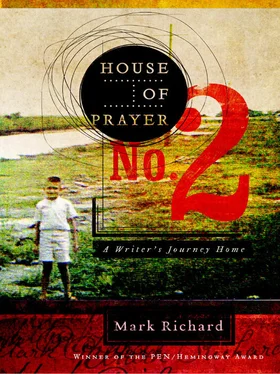In the morning you are packing up to go back to New York City, and the phone rings at the red-haired girl’s house in Venice. It’s Waits, he says it’s okay if you want to come down to the studio after all, so for the next four weeks you go into the studio with him at midnight to sit in on the mixing of The Black Rider .
During the day the red-haired girl takes you to the beach, which feels good on your hips, and you hang out together on the Strand. This is the girl whom you used to call at two or three or four in the morning when she was in New York and ask her what she was doing, and she’d say, Sleeping , but she’d stay on the phone while you recounted the date you’d just had. This was a person to whom you could tell everything, and you did, and now you realize that she’s still your friend even after everything you had told her about yourself.
One morning you are lying on the extra bed on the sunporch, where she’s been letting you stay, and you can see her through the open door in her office wearing a pair of her father’s old pajamas, with her feet up, drinking coffee and smoking a cigarette, reading the sports page, and you think, Her .
At breakfast you say why don’t the two of you just go down to city hall and get the paperwork done and get married right away. Maybe have some kids. Three. Two boys and a girl.
Her brother is running for governor of your state. The polls show him behind by thirty-three points. When she says she’s going to help with his campaign, you volunteer to drive her around the state in your Cadillac handing out campaign flyers and stapling posters to road signs. It’s a rainy fall in your state. Often you two are at late-night shift changes in front of factories and shipyards handing out her brother’s soggy campaign literature. A lot of the workers are about to ball up the paper and throw it on the ground until they see that she’s the daughter of that football coach. All of a sudden she’s standing in the rain with these workers talking about the glory days of the Washington Redskins. A couple of the guys always ask her to sign a campaign brochure. It is a long rainy campaign, and you seem to be changing out of wet clothes in adjoining rooms a lot.
Her brother wins the election, she goes back to California, and you drive the coast road back to New York. There is a letter waiting for you there, asking if you would like to teach at a school on a mountaintop in Tennessee that has a fifty-foot cross overlooking a big green valley beyond.
IT’S A SUNDAY AFTERNOON in late winter on the Tennessee mountaintop where there is that fifty-foot cross, and you’re alone deep in the woods when you get the call to ministry. All that is needed to round out this greeting-card epiphany would be for your face to be turned toward the bloody setting sun and you saying, Yes, Lord, yes, Lord, take me, I am yours .
Instead, you are not watching the sun at all, which is a mistake, because in this part of the world the sun sets quickly over the mountains and you are alone deep down a dark tree alley of an old logging road on the thousands of acres of mountaintop, and it will be pitch-black dark soon, and it is still winter and the temperature will drop below freezing, and no one knows where you are, and there is only your dog at home who would miss you if you do not return.
You have been filling your coat pockets with fossils you find in the muddy banks of the logging road that have been split open by the ice you are still fearful of walking on, and that is how you first saw the fossils, palm-sized reddish orange sandstone pieces with perfect impressions of calamite leaves and branches of lepidodendron trees. Three hundred million years ago these were hundred-foot Dr. Seuss–type trees with cartoon bamboo bark trunks topped with bursts of long thin leaves from the time when the mountaintop was a swampy forest on the edge of a warm shallow ocean.
You are running your thumb over a little twig of a perfect sprout forever part of the stone in the failing bloody light when you feel the Call.
The sun catches you out, and it’s a long walk home slipping and sometimes falling where you can’t see in the dark, you can only find your way by looking up and seeing what’s left of the sky between the wall of trees on either side. Okay, You have my attention , you say. Something is changing, and you will never ask God for a sign again.
YOU DON’T TELL ANYONE about this thing that has been placed on your heart. You don’t tell Jennifer, the red-haired girl in California, who is coming out to see you soon, you don’t tell the poet at the university, you don’t tell anyone; you go about teaching your writing class in your black academic gown on the Cambridge-style campus, and when you sit in chapel during the week, you think about what has happened to you, and you start praying your ass off.
It is good that Jennifer is coming to see you; you have missed her terribly. Your dog loves her, a good sign. She is concerned on a night when she sees you sitting next to a roaring fire you have built in the fireplace and you are sitting so close your clothes are hot to the touch because you need the heat to work on your bones; this is a cold and damp place in winter, and sometimes at the end of the day the pain is making your eyes water, and the fire seems to help.
You noticed when you were at her house in Venice that she burned votive candles to Saint Monica and she threw the I Ching . Visiting the mission in Santa Barbara, you find out she has never been baptized. You take her to chapel, and she sees you struggling with something spiritual, and she tells you one day she would like to learn more about faith. At that time catechism classes are starting on the campus for those wishing to be baptized later by the bishop, and you suggest she go to the classes, and she says she’ll go if you go with her, and you do.
Just before the Civil War some Episcopal clergy in the High Church tradition trekked up this mountain in eastern Tennessee and founded this college that Union soldiers subsequently dynamited into pieces that they carried home as trinkets and heirlooms. The event was depicted in the stained glass of All Saints Chapel when the church was rebuilt after the war. This is a good place to answer the Call. You begin to make little trips to the admissions office of the seminary on campus, and you quietly pick up some materials. One of your next-door neighbors is a middle-aged man with a wife and kids, and you look for him going out to his mailbox so you can “run into him” out there and float him a few questions.
The bishop is coming at Easter, those wishing to be baptized can do so at Easter vigil the night before, you tell Jennifer this is perfect timing for her. She says, Maybe later. You say, Now. Someone will need to present her as a candidate for baptism, and you tell her that you will do it. You have volunteered to read lessons from the Bible, and this time, because it is Easter and the bishop is coming, there will be a full choir and much pageantry and, of course, rehearsal. It is during a rehearsal that this thing happens to you.
You are sitting in a folding chair with your bit of the Old Testament to read in your hand, and a visiting Anglican bishop from the U.K. pulls up a chair and sits beside you. You have seen him around campus. It is a small college, and he has seen you as well. He has heard you are interested in entering the seminary, and this surprises you, but things like this happen at a place like this and you are the type of person that these types of things happen to. Yes, you are interested. Why? he asks, and you have a hard time articulating that you feel you have heard the Call. And do you know what is going to happen to you here? he asks, and you say you’ve been reading the catalog for the seminary, it looks good—theology, philosophy, literature, music … Yes, he says, three years of all that. Now, do you know what will happen to you once you leave here? Well … and you really don’t have an answer, but he does. He says, They’re going to farm you out to some little Podunk parish in Alabama, and over the course of your life you’ll reach maybe a hundred and fifty people. Okay, you say. Look, he says, you’re the writer in residence here, right? Yes, the Tennessee Williams fellow, you say. So you’re a pretty good writer? he asks, and you shrug, and he says, If you have the Call and you’re a good writer, you need to keep writing, you’ll reach many more people that way than if you go through seminary.
Читать дальше













